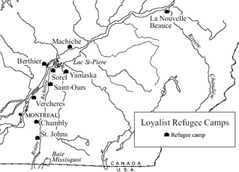Loyalists found themselves denied freedom of speech and subject to mob violence, which included tar and feathering, and in some cases, lynching. Minority groups, whether they opposed the Revolution or not, tended to be accused of doing so. For this reason, many Irish Catholics in Boston and Philadelphia thought it better to leave with the Crown forces. Moreover, those who in any capacity held office under the Crown after the Declaration of Independence in 1776 (e.g. the governors of each of the colonies, judges appointed by the British Crown, as well as senior colonial civil servants) were deemed guilty of treason, had their property confiscated, and were exiled.
The end of the Revolutionary War and the Treaty of Paris of 1783 caused a dilemma for the Loyalists. Despised as “traitors” and “Tories” by the victorious Patriots, most Loyalists had no choice but to flee by land or water, with what few possessions they could carry. Some went to Britain or the Bahamas, but the greater number were evacuated by sea from New York City to Nova Scotia or the St. John River Valley (soon to become New Brunswick), while others made their way by various routes and means to Canada, including present-day Quebec.
